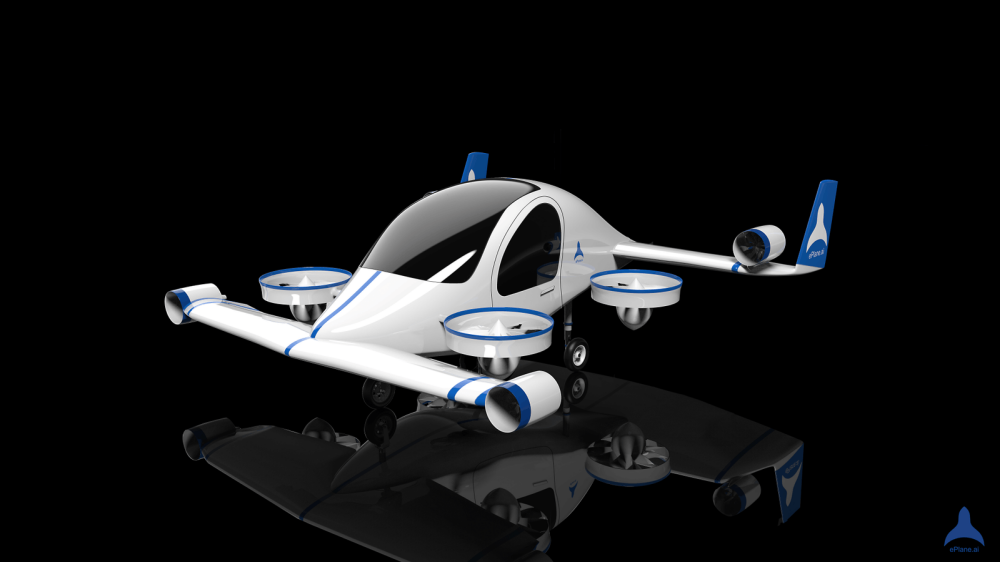Earlier this week, the government of India also notified a new policy and fresh set of rules for the usage of drones and unmanned aircraft systems. The coverage of drones under these new rules has increased from 300 kg to 500 kg. This would include drones that can carry heavy payloads and drone taxis, according to various reports.
Civil aviation minister Jyotiraditya Scindia said:
“The time is not far when like taxis that you see on roads, like Uber, etc., you will see taxis in the air under the new drone policy. I believe this is very possible.”
Now, two Chennai-based startups are aiming to take huge strides in this sector. Vinata Aeromobility, which was established earlier this year, recently announced that it will unveil what it claims is Asia’s first hybrid flying car at the Helitech Expo, slated to take place in London in October.
“We’ve been working on this concept since 2017-18. We were all set to launch the startup last year, but the pandemic delayed our plans,” says Yogesh Ramanathan, founder, CEO and lead designer at Vinata.
“Our proof-of-concept is ready and we’ll be unveiling a scaled-down model of the aircraft in October, along with more details about its design and specifications. The most interesting part about this flying car is that it will run on hybrid power, both electrical and sustainable biofuel,” adds Ramanathan, who has years of experience in automobile designing.
When it’s finally ready, Vinata’s two-seater, hybrid electric flying car, which will be based on electric vertical takeoff and landing (eVTOL) technology, would have a range of 100 km and a cruise speed of around 120 km per hour. Ramanathan says while personal air mobility is their long-term goal, he sees immediate business potential and use cases in the air cargo sector.
“The same aircraft platform will support low-altitude air cargo flights, which will have a weight capacity of up to 250kg. We then see more use cases in emergency medical services, fire services and the defense sector. Personal mobility and flying taxis come in the third stage,” adds Ramanathan.
Over at the ePlane Company, which was incubated at the Indian Institute of Technology, Madras and set up in February 2019, founder Satya Chakravarthy and his team are aiming to create an affordable flying taxi that not only promises quiet and pollution-free travel but also significantly less travel time.
The ‘e200’ aircraft is being touted as the world’s most compact flying taxi that can attain high speeds.
“We actually have a footprint of 4×4 metres, which is the most compact eVTOL vehicle in the world. This essentially means that we are targeting to take off and land from rooftops of apartment complexes, high-rise buildings, the front yards of urban homes and offices in the middle of cities,” Chakravarthy explains over the phone. “This makes it more accessible at all places.”
The two-seater aircraft is currently in a detailed design phase, which will be completed by the end of October, following which ePlane will start the fabrication of the first prototype. They expect to finish this process by February-March next year. The e200 will have a maximum cruise speed of 160 km per hour. More importantly, Chakravarthy explains that the aircraft will be able to conduct multiple flights on a single charge, with a range of around 200 km.
“Each trip will only take 5-10 minutes. We are also working with some fast charging companies to improve the charging time (of the vehicle) in between,” he adds.
The ePlane Company’s business model also focuses on multiple use cases, including an urban aerial mobility service that would replace road taxis for a similar price and using the aircraft for cargo, industrial and military applications.
Once additional infrastructural issues, like the availability of fast-charging points and autonomous air-traffic control systems, are ironed out in the years to come, Chakravarthy believes we could see a proper ecosystem of such aircraft in cities. “All we need in the near future to get these projects in the sky are clean landing spaces. That kind of infrastructure is already available for us to use.”
Source: mint lounge

